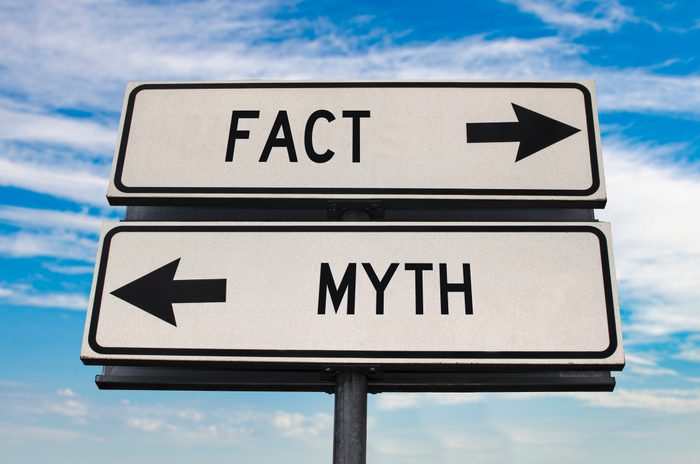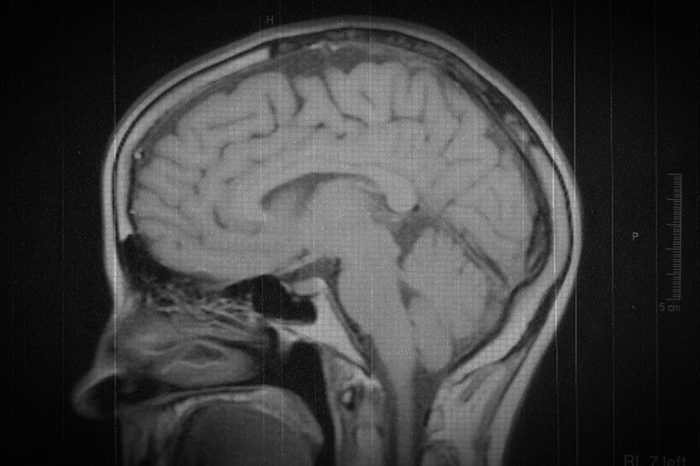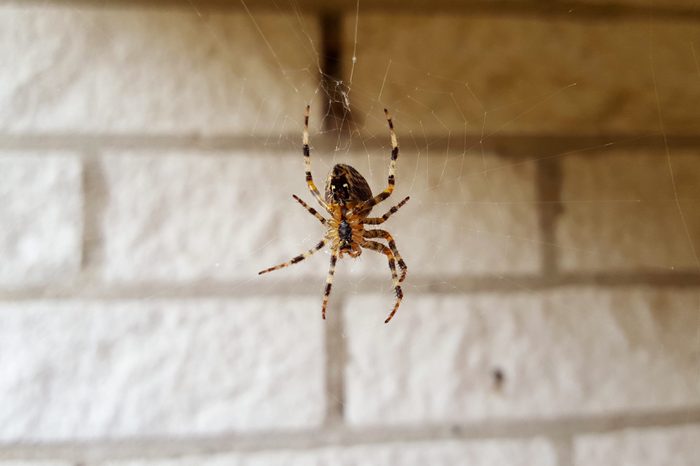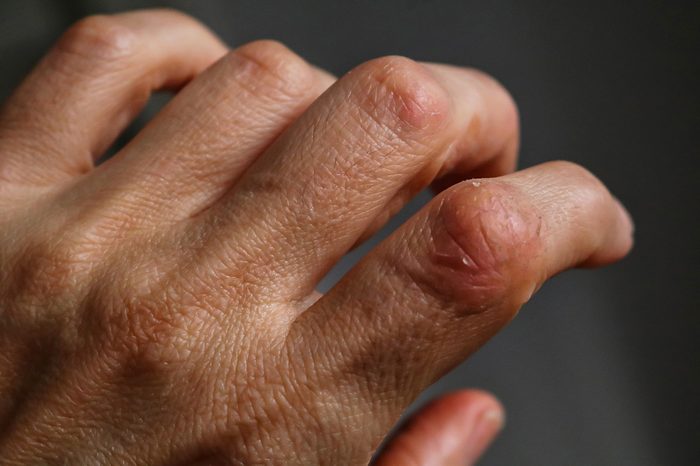These long acknowledged "facts" are anything but. We'd bet that you believed all of these lies—until today.

19 Weird Myths Our Parents Told Us—That You Probably Still Believe


Dogs only see black and white
Not true! Dogs are not quite capable of seeing the full color spectrum that humans can, but it isn’t just shades of gray for your favorite pups. Dogs see the colors of the world in yellows, blues and grays. So you may be better off getting a bright yellow toy for your dog than the more common red and orange.
Your dog will also have about 20% to 40% of human’s visual acuity, so anything you can see in the distance is going to look pretty blurry to them. But it’s not all downhill for them. Dogs see better in dimmer light and can detect any sort of movement or motion far better than we can.

You can see the Great Wall of China from space
This is sort of true, but mostly not. According to NASA, visitors to the moon can expect to catch a glimpse of the Great Wall of China … with telescopic lenses and zooming features, but certainly not with the naked eye. You can sometimes see the Great Wall in low Earth orbit, but at those heights, there are plenty of man-made structures you’ll catch a glimpse of, like the pyramids. “The only thing you can see from the moon is a beautiful sphere, mostly white, some blue, and patches of yellow, and every once in a while, some green vegetation. No man-made object is visible at this scale,” Alan Bean, an astronaut on the Apollo 12, was quoted as saying.

Adam and Eve ate an apple
We see in artwork, in TV shows and in movies that the forbidden fruit Adam and Eve ate, referenced in the bible, was an apple, right? Not so much. It is never actually referred to as any specific fruit. Many theologians theorize that, given the other geographical landmarks referenced, the fruit was likely a pomegranate or fig.

You have to wait 24 hours before reporting a missing person
Don’t do this, please! While a police officer or other emergency personnel might advise this in some instances—like if someone is late coming home from work, or they haven’t texted or called you back in a while—if you have reason to believe someone is in trouble, you should call the police immediately. There’s a world of difference between someone on a date who isn’t back on time, and someone who was meeting up with a partner who habitually abused them and is not responding to any contact. The NYPD has confirmed: If you’re worried about someone’s safety, call the police. They can advise you on what to do next for your particular situation, and get involved if need be.

Penguins are monogamous
We’re really sorry to burst your bubble—this one makes us pretty sad too. While many penguin species are monogamous during the mating season, they generally find a new mate each year. In addition, while many males tend to stick with their female friend for the season, female penguins are known to have up to three partners each season, and some males are chosen by up to two females. The New York Times even tested the DNA of penguins in captivity and found that 20% of the time, female penguins stray from their long-term partners.

You only use 10% of your brain
Not all your synapses are firing at once (can you imagine the chaos that would cause?!), but the rest of your brain isn’t just sitting there doing nothing. Your brain is working at full capacity all the time to keep you alive. “It turns out though, that we use virtually every part of the brain, and that [most of] the brain is active almost all the time,” neurologist Barry Gordon of Johns Hopkins School of Medicine told Scientific American in 2008.

You swallow seven spiders a year
We couldn’t be more thrilled that this turned out to be a lie! Scientific American reports that while most North American homes have three or four spiders living in them, spiders would not want to go anywhere near your bed, as it offers no prey (unless you have bedbugs!), and spiders definitely wouldn’t just crawl into your mouth and wait to die. The likelihood of this happening ever in your life is virtually zero, so you can stop worrying about it!

Sugar will make you hyperactive
Apparently, our parents were wrong: We totally could have had that cake for breakfast. Alright, maybe not really, but it’s not because the cake was going to make us hyper! This “well-known fact” has been proven time and time again to be an old wives’ tale. Studies found that children’s behavior did not change whether they had been fed sugar or not. What did change: parents’ perception of their child’s behavior. When parents were told their children had just been given a lot of sugar, they were more likely to say their child was hyperactive, even when the sugar fix was just a placebo.

Gum will stay in your stomach for seven years
Nope. Not true. This probably comes from the fact that bodies don’t digest gum well. But this doesn’t mean that a pile of swallowed gum is just filling up your stomach; it means your body hasn’t digested the gum before it passes straight through, along with the rest of the solid food you have eaten. Because of gum’s low nutritional components, Yale Scientific confirmed that while it does take slightly longer than other food to digest, gum will be out of your body in seven days at most.

You can’t swim for an hour after eating
Lies. The story went that the body sent blood to the stomach (and away from your limbs) while it digested food, and thus your limbs would grow tired more quickly. At best, you could get cramps, and at worst, as the story goes, you could drown. Luckily for all you avid swimmers, Mayo Clinic has confirmed that there is absolutely no scientific basis for this theory. Eat whatever you want and hop right back into the water!

You lose more body heat through your head
This rumor is why we had to wear awful hats in the winter, but it just isn’t true. The study that this common misperception was based on had a lot of additional factors that skewed the end result, and countless follow up studies have disproven this idea over and over again. The real reason you “lose more body heat through your head”? Because in cold weather, your head is the part of you that’s most likely not covered up. So do wear a hat. But also be sure to wear pants, a jacket and all the other warm winter things.

Your tongue has different sections for different tastes
Nope. That map we’ve all seen different variations of? Total bogus. While some individual taste buds taste certain flavors more strongly, they aren’t located only in certain areas of your mouth. The science experts at Smithsonian Magazine confirmed that this one was a lie, saying, “Indeed, results from a number of experiments indicate that all areas of the mouth containing taste buds—including several parts of the tongue, the soft palate (on the roof of your mouth) and the throat—are sensitive to all taste qualities.”

Cracking your knuckles will give you arthritis
It might gross out the people around you, but that’s about it. Experts at Harvard conducted several studies that compared arthritis rates among people who never cracked their knuckles and those who had done it habitually for years and found no raised risk of arthritis in the knuckle crackers. Of course, frequent knuckle cracking may reduce grip strength, so maybe keep the habit to a minimum anyway.

Cavemen lived in caves
To fully unpack this lie, we need to define “cavemen” a bit better. It’s actually a misleading word people use when referring to Neanderthal hunter-gatherers and farmers who existed roughly 400,000 to 30,000 years ago. Caves were certainly inhabited during the Paleolithic era, but as many primitive people were often on the move tracking prey, and Stone Age families probably lived in huts made of wood bent into circles and covered in animal skins.

The North Pole is on the north side of the planet
That’s right. You heard us. North isn’t really north. To explain this one, we’re turning to physics expert Christopher S. Baird. “A magnetic compass does not point to the geographic north pole,” he writes in a post on Science Questions with Surprising Answers. “A magnetic compass points to the earth’s magnetic poles, which are not the same as earth’s geographic poles. Furthermore, the magnetic pole near earth’s geographic north pole is actually the south magnetic pole.” When it comes to magnets, opposites attract. “This fact means that the north end of a magnet in a compass is attracted to the south magnetic pole, which lies close to the geographic north pole,” Baird explains. Mind officially blown.

Watching TV too close to the screen will damage your eyes
Nope. You can sit as close as you’d like, kind of. According to experts at the American Academy of Ophthalmology, watching the TV from up close doesn’t cause any permanent eye damage to your eye whatsoever. Sitting very near to the screen could cause eye strain, but luckily, it’s a temporary condition.

Humans have five senses
We all learned the sight, sound, smell, touch, taste model of senses in elementary school. This theory dates back to Aristotle, around 300 B.C. But science has advanced a bit since then. Experts still debate the exact number, but most agree that humans have at least 10 senses, while some claim the number is as high as 23. Some of these, in addition to the original five, include the sense of balance, the sense of pain and the perception of time.

Eating carrots will help your vision
Only if you have a roundabout way of looking at things. Vitamin A does help your eyesight, and while carrots don’t have any vitamin A in them, they do have beta-carotene, which the body does convert into vitamin A. Other foods with lots of beta-carotene? Sweet potatoes, spinach, butternut squash, apricots, cantaloupe and even Romaine lettuce. If you get your vitamin A directly from the source, eggs and milk are also great sources of vitamin A.

Don’t ever wake up a sleepwalker
If a sleepwalker isn’t in any danger, it is still probably best to let them keep sleeping, but the danger of waking them has nothing to do with their safety, it has to do with yours. It is possible for those sleepwalking to attack the person waking them, so the Sleep Foundation recommends either gently turning them back in the direction of their bed, or walking nearby for a while to ensure they do not get into a car to drive off while still asleep or run into something that could cause injury. If you are unable to return the sleepwalker to bed, try to wake them in a gentle way and from a safe distance, as the person will most likely be disoriented upon waking up.
Why trust us
At Reader’s Digest, we’re committed to producing high-quality content by writers with expertise and experience in their field in consultation with relevant, qualified experts. We rely on reputable primary sources, including government and professional organizations and academic institutions as well as our writers’ personal experiences where appropriate. We verify all facts and data, back them with credible sourcing and revisit them over time to ensure they remain accurate and up to date. Read more about our team, our contributors and our editorial policies.
Sources:
- PetMD: “How Do Dogs See the World?”
- NASA: “Great Wall”
- BBC: “Can you see the Great Wall of China from space?”
- NPR: “’Paradise Lost’: How The Apple Became The Forbidden Fruit”
- The Missing: “NYPD: How The Police Handles Missing Persons Cases”
- New York Times: “Do Penguins Mate for Life? Not According to These Paternity Tests”
- Scientific American: “Do People Only Use 10 Percent of Their Brains?”
- Scientific American: “Fact or Fiction?: People Swallow 8 Spiders a Year While They Sleep”
- New England Journal of Medicine: “Effects of Diets High in Sucrose or Aspartame on The Behavior and Cognitive Performance of Children”
- Yale Scientific: “Can gum really stay in your stomach for 7 years?”
- Mayo Clinic: “Mayo Clinic Minute: Should you wait 30 minutes to swim after eating?”
- WebMD: “Do We Really Lose Most of Our Heat Through Our Heads?”
- Smithsonian Magazine: “The Taste Map of the Tongue You Learned in School Is All Wrong”
- Harvard Health Publishing: “Knuckle cracking: Annoying and harmful, or just annoying?”
- English Heritage: “Ask the expert: Did cavemen actually live in caves?”
- Science Questions with Surprising Answers: “Why does a magnetic compass point to the Geographic North Pole?”
- American Academy of Ophthalmology: “Can Sitting Too Close to the TV Damage Your Eyes?”
- World Economic Forum: “Humans have more than 5 senses”
- American Optometric Association: “Vitamin A beneficial for eyes, just not for preventing myopia”
- Cleveland Clinic: “11 Foods Full of Beta-Carotene and Their Health Benefits”
- Sleep Foundation: “Sleepwalking: What Is Somnambulism?”


















